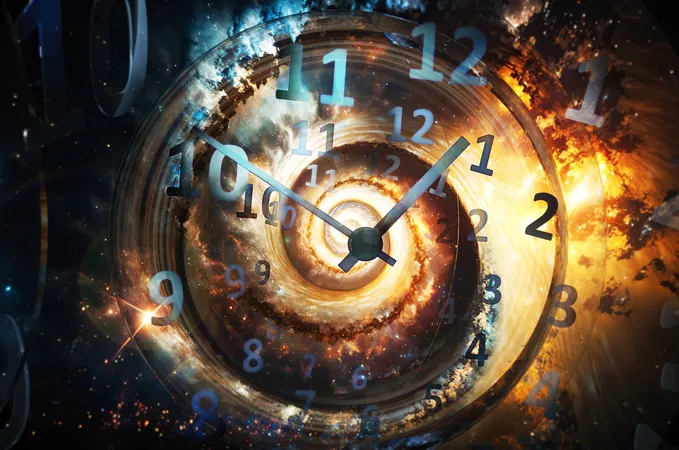
Is Time Just an Illusion? Groundbreaking Theories Challenge Our Perception of Existence
2025-01-09
Author: Wai
Time, a seemingly omnipresent aspect of our lives, is something we seldom stop to question. We rely heavily on clocks to schedule our days and mark significant events in our lives. However, intriguing theories in modern physics are challenging the fundamental nature of time itself, suggesting it may not exist as we perceive it.
Many physicists are starting to entertain the idea that time could merely be a construct of human perception. This perspective posits that our belief in a continuous "now" is possibly an illusion created by our brains. For instance, renowned physicist Dr. Carlo Rovelli, known for his contributions to loop quantum gravity, argues that our perception of a global time may be entirely absent in the universe's fundamental laws.
The Illusion of Time in Everyday Life
Our lives are governed by clear distinctions between past, present, and future. We set alarms, meet deadlines, and reminisce about experiences. Yet, in stark contrast, the equations of physics do not prescribe a universal "now." This dissonance raises profound questions about the nature of reality and our interpretations of it.
Gravity's Role in Our Perception of Time
Einstein's theories of relativity introduced revolutionary concepts regarding the nature of time. For example, his theory demonstrates that time moves differently depending on one’s proximity to a massive object or how fast they are traveling. Clocks tick slightly slower at sea level than at the top of a mountain due to the stronger gravitational pull at lower altitudes.
This phenomenon, known as time dilation, has been validated through experimental evidence, including the behavior of atomic clocks and observations of fast-moving particles. In essence, time is not a uniform experience; it varies based on different conditions.
An Elastic Concept
Our intuitive sense that time flows continuously from one moment to the next may stem from our neurological wiring, rather than a universal truth. The nature of time, as highlighted by general relativity, lacks a defined progression; rather all moments might coexist equally in a timeless reality. Some physicists theorize that the perception of time flowing may arise from the interactions and correlations between various objects.
Quantum Mechanics Poses New Questions
At a quantum level, the complexities deepen. Traditional views treat time as a constant parameter. However, quantum experiments hint at the possibility that no single observer can definitively state a universal "now." Some theorists aim to eliminate time from equations altogether in attempts to unify various physical principles. For instance, the Wheeler-DeWitt equation omits time, emphasizing correlations instead of a chronological evolution of the universe.
The Arrow of Time: Why It Matters
Despite indications that time might be an illusion, we experience an "arrow of time"—a clear directionality moving from past to future. This consistency can be linked to the second law of thermodynamics, which dictates that in an isolated system, disorder, or entropy, tends to increase over time. Thus, our perception of time's flow aligns with an overarching tendency towards disorder.
The low-entropy conditions at the universe's inception established a path towards irreversible processes, further reinforcing our understanding of events progressing from earlier to later.
The Human Experience of Time
Fascinating debates emerge from these theories. Some scholars propose that our understanding of time may evolve similarly to how we perceive currency—as an occupational facade rather than a solid reality. Yet, despite the ambiguities concerning the essence of time, human life continues to rely heavily on its structured passage.
As our hearts beat and our clocks tick, we’re guided by an unwavering belief that tomorrow lies ahead, yet to be experienced. The question may not be whether time exists, but why our cognitive frameworks cling so firmly to the idea of time's relentless passage.
Will future generations grasp the elusive nature of time as we unravel more about the universe? As we advance in our scientific pursuits, only time can possibly reveal the depths of this confounding enigma.
Stay updated with our latest explorations into the cosmos and the mysteries of existence—who knows what else science may unveil!


 Brasil (PT)
Brasil (PT)
 Canada (EN)
Canada (EN)
 Chile (ES)
Chile (ES)
 Česko (CS)
Česko (CS)
 대한민국 (KO)
대한민국 (KO)
 España (ES)
España (ES)
 France (FR)
France (FR)
 Hong Kong (EN)
Hong Kong (EN)
 Italia (IT)
Italia (IT)
 日本 (JA)
日本 (JA)
 Magyarország (HU)
Magyarország (HU)
 Norge (NO)
Norge (NO)
 Polska (PL)
Polska (PL)
 Schweiz (DE)
Schweiz (DE)
 Singapore (EN)
Singapore (EN)
 Sverige (SV)
Sverige (SV)
 Suomi (FI)
Suomi (FI)
 Türkiye (TR)
Türkiye (TR)
 الإمارات العربية المتحدة (AR)
الإمارات العربية المتحدة (AR)